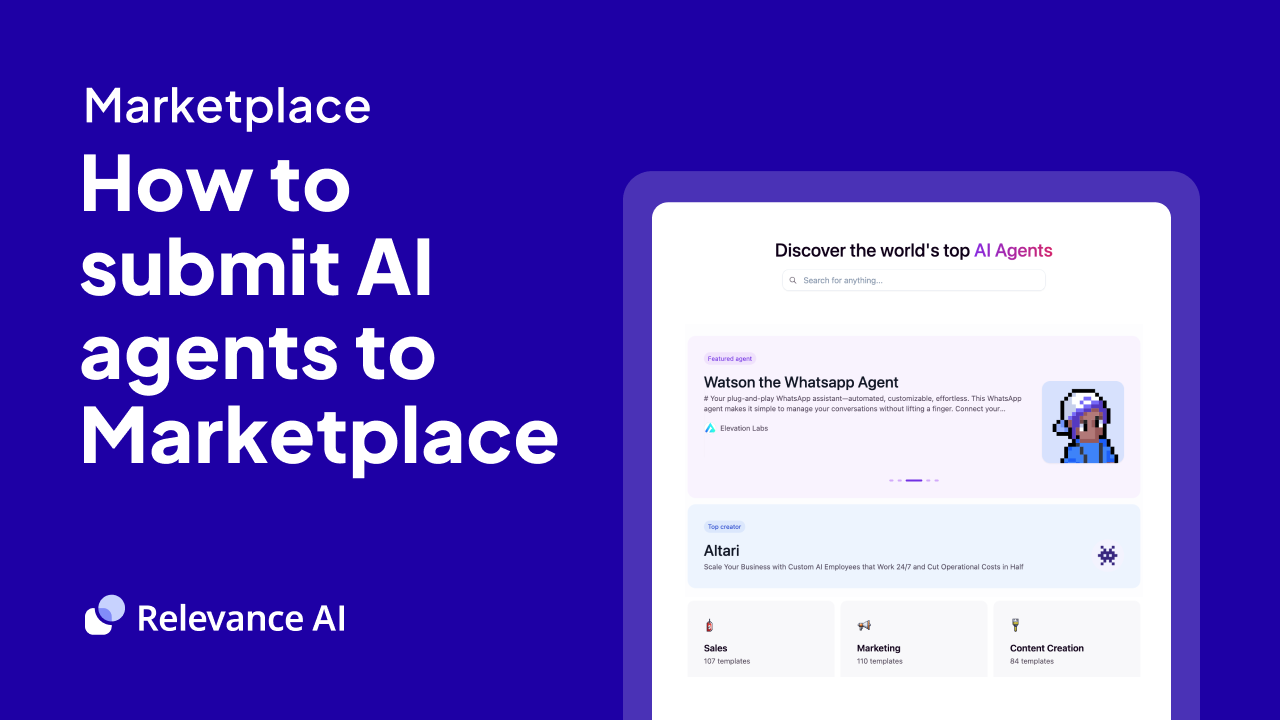Replicate
Understanding Replicate's Cloud Platform and Features
Replicate stands as a cloud platform that simplifies machine learning model deployment through an intuitive API interface. The platform eliminates traditional barriers to AI implementation by providing instant access to powerful models without requiring complex infrastructure setup. At its core, Replicate democratizes access to state-of-the-art AI capabilities, making them accessible to organizations of all sizes.
The platform's standout features include:
- Simple API-first architecture for quick model deployment
- Automatic scaling based on demand
- Extensive model marketplace with pre-trained options
- Detailed monitoring and logging capabilities
- Pay-per-use pricing model
- Support for custom model deployment

Benefits of AI Agents for Replicate
What would have been used before AI Agents?
Before AI agents became available for Replicate, [developers](https://relevanceai.com/agent-templates-roles/business-development-representative-bdr-ai-agents-1) had to manually handle [model deployment](https://relevanceai.com/agent-templates-tasks/workflow-automation-ai-agents), testing, and scaling. This meant writing extensive custom code, managing infrastructure, and dealing with the complexities of ML model serving. Teams spent countless hours configuring servers, optimizing performance, and troubleshooting deployment issues rather than focusing on model development and refinement.
What are the benefits of AI Agents?
AI agents transform how teams work with Replicate by abstracting away the operational complexity of ML model deployment. They function as digital teammates who handle the intricate details of model serving, allowing developers to focus on higher-value work.
The agents automatically manage crucial tasks like:
- Dynamic resource allocation based on model requirements
- Real-time performance monitoring and optimization
- Automated scaling in response to varying workloads
- Intelligent error handling and recovery
A key advantage is the agents' ability to learn from usage patterns and automatically optimize deployment configurations. They analyze metrics like latency, throughput, and resource utilization to make data-driven improvements without human intervention.
The network effects are particularly powerful - as more teams use AI agents with Replicate, the agents become increasingly sophisticated at predicting resource needs and preventing potential issues before they occur. This creates a flywheel effect where each deployment makes the entire system smarter.
For engineering teams, this means significantly reduced operational overhead and faster time-to-production for new models. The agents effectively serve as ML infrastructure experts, applying best practices and learnings across thousands of deployments to each new implementation.
Potential Use Cases of AI Agents with Replicate
Processes
Replicate AI agents transform complex machine learning deployment into manageable workflows. They handle model versioning, scaling, and infrastructure management - tasks that typically require dedicated ML teams. The agents monitor model performance, automatically adjust resource allocation, and maintain deployment pipelines without constant human oversight.
When development teams need to test multiple model variations, Replicate agents orchestrate parallel experiments, track metrics, and surface meaningful comparisons. This systematic approach to model evaluation cuts through the noise to identify truly impactful improvements.
Tasks
Model deployment and scaling become significantly more manageable with Replicate agents handling key operational tasks:
- Automated model versioning and dependency management
- Dynamic resource scaling based on inference demand
- Real-time [performance monitoring](https://relevanceai.com/agent-templates-tasks/performance-evaluation-ai-agents) and alerting
- API endpoint management and documentation updates
- Cost optimization across cloud providers
- Automated testing of model updates
The agents excel at managing the infrastructure complexity that comes with deploying machine learning at scale. They handle container orchestration, load balancing, and auto-scaling while maintaining detailed logs for debugging and optimization.
For [ML engineers](https://relevanceai.com/agent-templates-roles/sales-engineer-ai-agents-1) and data scientists, these agents eliminate hours of DevOps work. Rather than wrestling with infrastructure, teams can focus on model architecture and training improvements. The agents handle the operational heavy lifting - from monitoring inference latency to managing model rollbacks when issues arise.
When integrated into existing ML workflows, Replicate agents create a more resilient deployment pipeline. They catch potential issues early through automated testing and provide detailed telemetry for troubleshooting. This systematic approach to model operations reduces downtime and accelerates the path from research to production.

Industry Use Cases
Replicate AI agents are transforming how businesses deploy and scale machine learning models across industries. The ability to instantly spin up powerful AI models through simple API calls creates opportunities that were previously locked behind complex infrastructure and technical barriers.
While many companies experiment with [AI deployment](https://relevanceai.com/agent-templates-tasks/workflow-step-automation-ai-agents), Replicate's approach stands out by removing the traditional friction points of model hosting and [scaling](https://relevanceai.com/agent-templates-tasks/resource-usage-optimization-ai-agents). Teams can focus on solving real business problems instead of wrestling with infrastructure setup and maintenance.
The practical applications span from creative studios leveraging stable diffusion models for content creation, to research institutions running complex simulations, to software companies embedding AI capabilities directly into their products. Let's explore some concrete examples of how different sectors are putting these capabilities to work.
What makes these use cases particularly compelling is how they demonstrate the intersection of accessibility and sophistication - organizations can tap into state-of-the-art AI models without building an entire machine learning operations stack from scratch.
Healthcare Industry: Transforming Medical Imaging Analysis with Replicate AI
Medical imaging analysis represents one of the most impactful applications of Replicate's AI capabilities in healthcare. [Radiologists](https://relevanceai.com/agent-templates-roles/technical-support-specialist-ai-agents-1) and clinicians face mounting pressure to analyze thousands of medical images daily while maintaining high diagnostic accuracy. Traditional manual review processes simply can't scale to meet this growing demand.
Replicate's platform enables healthcare providers to deploy sophisticated [computer vision models](https://relevanceai.com/agent-templates-tasks/pattern-anomaly-detection-ai-agents) that can pre-screen chest X-rays, MRIs, and CT scans for potential abnormalities. The key advantage lies in Replicate's ability to run these complex models in the cloud without requiring massive on-premise computing infrastructure.
A typical workflow might involve a radiologist receiving 200+ chest X-rays to review each day. By integrating Replicate's AI models into the imaging pipeline, the system can automatically flag concerning cases for priority review while providing initial annotations of potential issues. This allows radiologists to focus their expertise on the most critical cases first.
The real breakthrough comes from Replicate's flexibility in deploying different specialized models. A hospital could run one model optimized for detecting lung nodules, another for identifying bone fractures, and a third for spotting early signs of pneumonia - all through the same cloud infrastructure. This multi-model approach mirrors how human specialists develop expertise in specific conditions.
Beyond pure efficiency gains, this AI-augmented workflow leads to measurably better patient outcomes. Studies show that AI-assisted radiologists catch subtle abnormalities that might be missed in manual review, particularly during high-volume periods when fatigue becomes a factor. The technology serves as a powerful second set of eyes.
For healthcare organizations, Replicate removes the technical barriers to adopting AI imaging analysis. Rather than building and maintaining complex ML infrastructure, hospitals can focus on their core competency - providing excellent patient care. The platform handles the heavy lifting of model deployment, scaling, and updates.
Manufacturing: Optimizing Quality Control with Computer Vision on Replicate
Manufacturing [quality control](https://relevanceai.com/agent-templates-tasks/customer-service-quality-monitoring-ai-agents) presents a perfect testing ground for Replicate's computer vision capabilities. Production lines moving at high speeds generate thousands of products per hour, making traditional manual inspection both costly and error-prone. The most innovative manufacturers are shifting to AI-powered visual inspection systems that can spot defects in real-time.
Replicate's platform enables manufacturers to deploy sophisticated computer vision models directly into their production environments. A typical automotive parts manufacturer might process 50,000+ components daily. By integrating cameras on the production line with Replicate's cloud infrastructure, every single part gets inspected with superhuman precision.
The technology excels at detecting microscopic flaws that human inspectors might miss - hairline cracks in metal castings, subtle color variations indicating chemical composition issues, or misaligned components off by fractions of a millimeter. These models run continuously without fatigue, maintaining consistent accuracy even during overnight shifts.
What makes Replicate particularly valuable is its ability to handle multiple inspection models simultaneously. A single production line might run separate models for surface defect detection, dimensional compliance, and assembly verification. Each model can be fine-tuned independently as manufacturing processes evolve.
The data feedback loop creates compounding value over time. Every detected defect helps train the models to become more accurate. Manufacturers gain unprecedented visibility into quality trends, allowing them to address root causes before they become systemic issues. This proactive approach dramatically reduces waste and rework costs.
For manufacturing teams, Replicate eliminates the complexity of building internal AI infrastructure. Rather than hiring ML engineers and managing GPU clusters, [quality engineers](https://relevanceai.com/agent-templates-roles/quality-assurance-manager-ai-agents) can focus on defining inspection criteria and improving production processes. The platform handles the technical heavy lifting of model deployment and scaling.
The impact extends beyond just catching defects - it fundamentally transforms how manufacturers approach quality control. With AI handling routine inspection tasks, human quality engineers can focus on solving complex problems and continuous improvement initiatives that drive long-term value.

Considerations for Replicate AI Agents
Implementing Replicate AI agents requires careful planning and strategic decision-making to ensure successful deployment and adoption. Organizations need to evaluate their technical infrastructure, data governance policies, and team readiness before moving forward.
Technical Considerations
[API integration](https://relevanceai.com/integrations/openai) complexity often presents the first hurdle. Teams must ensure their existing systems can handle the additional load and [data processing](https://relevanceai.com/agent-templates-tasks/automated-data-validation-ai-agents) requirements. Network latency and bandwidth constraints need thorough evaluation, especially for organizations processing large media files or running multiple concurrent model inferences.
Model selection and optimization become critical factors. Different AI models have varying resource requirements and performance characteristics. Teams should benchmark multiple options to find the right balance between accuracy, speed, and cost.
Operational Challenges
Cost management requires ongoing attention. While Replicate's pay-per-use model offers flexibility, usage patterns need monitoring to prevent unexpected expenses. Organizations should implement usage limits and tracking mechanisms from day one.
Training and documentation deserve significant investment. Teams need clear guidelines on model capabilities, limitations, and best practices. Creating internal knowledge bases and establishing feedback loops helps maintain quality and consistency.
Security and Compliance
Data privacy concerns demand robust safeguards. Organizations must implement proper encryption, access controls, and audit trails. Understanding data residency requirements and ensuring compliance with industry regulations becomes essential for sensitive workloads.
Version control and model governance require systematic approaches. Teams should establish clear protocols for model updates, testing procedures, and rollback mechanisms to maintain system stability.
Performance Optimization
Response time optimization needs continuous attention. Implementing caching strategies, load balancing, and request queuing helps maintain consistent performance under varying loads. Regular performance audits identify bottlenecks and optimization opportunities.
Error handling and fallback mechanisms protect against service disruptions. Teams should develop comprehensive error recovery strategies and maintain backup systems for critical operations.
Transforming Enterprise AI Through Digital Automation
The integration of AI agents with Replicate marks a significant shift in how organizations approach [machine learning operations](https://relevanceai.com/agent-templates-tasks/workflow-automation-ai-agents). By abstracting away infrastructure complexity and automating crucial operational tasks, these digital teammates enable teams to focus on innovation rather than maintenance. The technology's impact spans across industries, from healthcare to manufacturing, demonstrating the versatility and power of accessible AI deployment. As the platform continues to evolve, its network effects will likely drive even more sophisticated [automation](https://relevanceai.com/agent-templates-tasks/workflow-step-automation-ai-agents) and optimization capabilities, further reducing the barriers to enterprise AI adoption.











